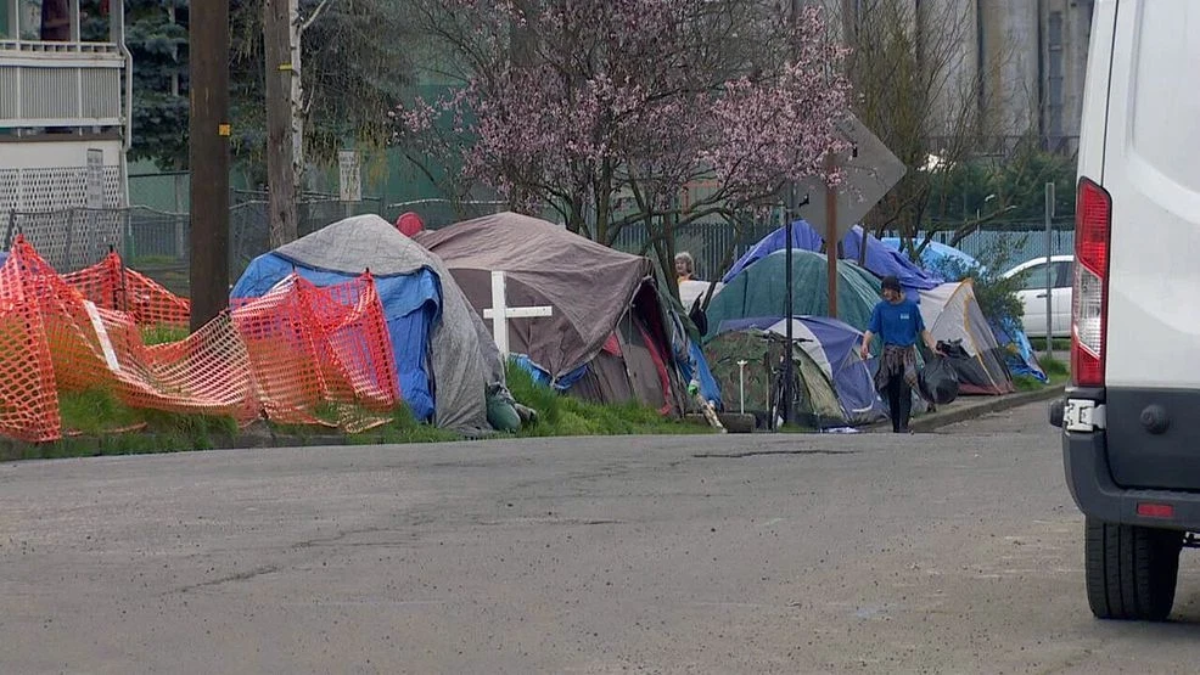Efforts to address growing homeless encampments in Vancouver, Washington, may slow down or halt altogether as the city faces significant budget shortfalls. City officials warned this week that financial constraints could delay or limit cleanups, further straining public safety resources and social service responses.
At a city council workshop on Monday, Vancouver’s Public Works and Homeless Assistance teams outlined the potential consequences of reduced funding, which include fewer encampment removals, longer response times, and increased public health and safety risks.
Financial Strain Threatens Current Strategy
The city has operated under a structured plan to manage homelessness through a combination of camp removals, temporary shelter services, and outreach. This coordinated effort has included law enforcement, sanitation crews, social workers, and nonprofits.
However, with a projected $45 million budget deficit over the next five years, officials are now considering significant program cuts, including to homeless camp response efforts.
“Without sufficient funding, our ability to respond to encampments, especially those that pose immediate safety hazards, will be significantly compromised,” said Jamie Spinelli, the city’s homeless resources manager. “We want to keep the community safe, but we also want to ensure our unhoused residents are treated humanely and have options for services and shelter.”
Rising Numbers and Complex Needs
Vancouver, like many cities across the Pacific Northwest, has experienced a sharp rise in homelessness over the past few years. The 2023 Point-in-Time Count in Clark County recorded over 1,300 people experiencing homelessness—up nearly 20% from the previous year.
A growing portion of these individuals are living in unsanctioned outdoor encampments.
City leaders have attempted to balance enforcement with compassionate outreach. Recent cleanups have focused on high-risk camps near schools, parks, and transportation corridors. Yet each response requires significant staffing, logistics, and resources, costing thousands of dollars per cleanup.
According to city budget documents, Vancouver spent over $2 million last year on camp removals and related services. As financial pressure mounts, maintaining even the current level of response may not be feasible.
Community Impact and Public Safety Concerns
Residents and businesses near established camps have voiced growing frustration, citing issues ranging from environmental damage to public drug use and crime.
“We’re not asking for people to be punished—we’re asking for our streets and parks to be safe,” said Melanie Curtis, a local small business owner whose shop is located near a large encampment along Mill Plain Boulevard. “These camps are becoming larger and more entrenched.”
At the same time, advocates caution that abrupt or poorly planned camp removals can worsen the problem, displacing individuals without offering real solutions.
“Moving people from place to place without stable housing options is not only ineffective, it’s traumatizing,” said Trish Garcia, a housing advocate with the nonprofit Share Vancouver. “We need consistent funding not just for enforcement, but for shelter, mental health, and addiction services.”
Programs at Risk
Among the programs facing cuts is the Homeless Assistance and Resources Team (HART), which coordinates outreach to unsheltered residents during camp removals. The team provides resource referrals, hygiene supplies, and assistance with shelter placement.
Officials say losing or scaling back HART could lead to more confrontational and less productive interactions.
Another threatened initiative is the Safe Stay Community program, which provides managed tiny home-style shelters with on-site services. The city currently operates three Safe Stay sites and had plans to expand. Without funding, that growth is uncertain.
“Our goal is to move people from encampments into Safe Stay communities and ultimately into permanent housing,” said Vancouver City Manager Eric Holmes. “But every step of that process requires investment.”
State and Federal Funding Uncertain
While Vancouver has relied on a mix of local, state, and federal funds to support its homeless response, officials noted that pandemic-era funding streams are ending. Additional grants have become more competitive, and some previously secured funds are not guaranteed in the upcoming biennium.
The Washington State Department of Commerce, which oversees homelessness response funding, has encouraged municipalities to prioritize regional coordination and seek public-private partnerships. However, cities like Vancouver say they still need dedicated, long-term financial support to meet the scale of the crisis.
For more information on Washington’s homelessness response efforts, visit the Washington State Department of Commerce.

What Happens Next?
City council members have not made final decisions but are expected to revisit the budget during upcoming meetings. Some members expressed concern about eliminating critical homeless services but acknowledged that trade-offs are inevitable.
Councilmember Sarah Fox emphasized the importance of maintaining public health and safety. “We cannot ignore the impact these camps are having on our community,” she said. “But we also cannot forget the humanity of those who are living in these camps.”
City staff have been directed to explore alternate funding sources, including federal emergency housing grants, philanthropic contributions, and regional partnerships with Clark County.
In the meantime, outreach workers and advocates worry that slowing or suspending camp removals without alternative housing options could lead to worsening conditions for both the housed and unhoused.
“We’re at a tipping point,” said Garcia. “If we don’t maintain momentum, the camps will grow, the public health risks will rise, and it will be even more costly—financially and morally—to fix later.”
For more details on city budgets and public health funding in Washington, visit the Washington State Office of Financial Management.
Disclaimer – Our team has carefully fact-checked this article to make sure it’s accurate and free from any misinformation. We’re dedicated to keeping our content honest and reliable for our readers.
